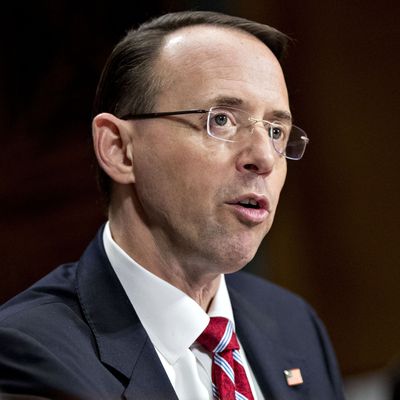
On Thursday night, Deputy Attorney General Rod Rosenstein released a weird statement. “Americans should exercise caution before accepting as true any stories attributed to anonymous ‘officials,’ particularly when they do not identify the country — let alone the branch or agency of government — with which the alleged sources supposedly are affiliated,” wrote Rosenstein, who was put in charge of the Justice Department’s Russia investigation after Attorney General Jeff Sessions was forced to recuse himself. “Americans should be skeptical about anonymous allegations. The Department of Justice has a long-established policy to neither confirm nor deny such allegations.”
It’s not clear what prompted Rosenstein to issue this vague warning to the American people, though the timing likely offers some clues: The statement came a day after the Washington Post and the New York Times reported that special counsel Robert Mueller was looking into whether President Trump’s firing of James Comey constituted obstruction of justice, and a couple of hours after the Post reported that Mueller was also examining Jared Kushner’s financial dealings with Russia. All of those stories included information attributed to officials who, unsurprisingly, requested anonymity. Of course, the statement could also have been written in anticipation of another explosive, not-yet-published report.
Rosenstein has a well-documented reputation for independence and nonpartisanship. He’s also the person who appointed Mueller in the first place. However, his statement did seem to reflect Trump’s obsession with leaks and what he has called “phony stories.” If Rosenstein was delivering a message from Trump, it wouldn’t be the first time he’d helped carry out the president’s agenda: in May, he wrote a memo giving Trump cover to fire Comey.
As reports of Trump’s desire to fire the special counsel emerged earlier this week, Rosenstein appeared to be trying to thread the needle between demonstrating that his integrity was intact and avoiding further antagonizing the president. Asked if he would follow Trump’s potential order to dismiss Mueller, Rosenstein said, “I’m not going to follow any orders unless I believe those are lawful and appropriate orders. If there were good cause I would consider it. If there were not good cause, it wouldn’t matter to me what anybody says.” As Matthew Yglesias suggested, even if Trump did ask Rosenstein to put out the statement, the prosecutor may have had his own reasons for complying:
Given the way things tend to go with the Trump administration, we’ll probably have an explanation soon enough.





























